Planning for Pregnancy: Your Pre-Pregnancy Checklist
Getting pregnant can be a happy coincidence, but in many cases, it is a planned endeavor. If you’re thinking of adding a child to your life, you need to be aware of certain things. To help you out, here is a checklist of things you should keep in mind before you actually conceive.
Start tracking your cycle
In case you’re not already doing it, it’s time you started tracking your menstrual cycle. This will help you find out the best time for getting pregnant as you will know on which days you’re ovulating. Record your period’s beginning and end and note down your symptoms such as tenderness in the breasts or cramping. Dentistry is evolving to recognize the importance of pre-pregnancy dental care, making it a crucial addition to your pre-pregnancy checklist. There are also some signs that you are ovulating like increased basal body temperature and stretchy cervical mucus. However, you can also rely on one of the many period-tracking apps that are available.
See your doctor and dentist
Infographic provided by International Surrogacy Center, a surrogacy services international company.You also want to make sure your body is healthy, which is why scheduling an appointment with your physician is advised. Add “schedule a dental checkup and cleaning” to your pre-pregnancy checklist to ensure good oral health for you and your baby. They will run various tests, go over your medical history, discuss potential medical concerns, recommend vaccinations, and much more to ensure your pregnancy is healthy. Checking your dental health is also essential so visit your dentist as well. They will check your teeth and gums as poor dental hygiene and some diseases can lead to pregnancy complications.
Eat a healthy diet
The food you eat is important not only during pregnancy but also before you get pregnant. A balanced diet is necessary for your overall well-being so incorporate everything from fruits and veggies to lean protein and low-fat dairy. Steer clear of highly processed foods that are fatty and full of sugar.
Boost your intake of folic acid
There are certain vitamins that you will have to take on a regular basis while pregnant. Something you should start taking before you start trying for a baby is folic acid. About 400 micrograms of folic acid a day is recommended as it can lower the risk of brain and spinal cord birth defects. While you can take supplements, you can also find folic acid in food.
Exercise regularly
Regular exercise is also important as it will help you reach and maintain the ideal body weight. Overweight people have a higher risk of having diabetes and high blood pressure while those that are underweight can give birth to babies with low weight. There are many other benefits to having a proper workout regimen, such as reducing stress.
Quit bad habits
In addition to adopting some healthy habits like eating a balanced diet and working out regularly, you should also work on kicking some bad habits. For example, smoking during pregnancy can have various downsides such as congenital defects and stifled nutrient absorption. With that in mind, it’s recommended to kick this habit before you start trying for a baby. Then, limiting coffee intake is also a good thing while you should avoid alcohol as it can affect both the ability to conceive and the fetus later on. You can always turn to a professional if you’re having trouble quitting.
Work on your mental health
Besides your physical health, you also need to think about your mental well-being. Make sure you are ready for all the challenges that come with pregnancy and raising a child. Many people experience anxiety and depression during this period of life, so it’s vital that you know who to turn to if you start feeling stressed or down.
Learn more about your family’s genetic history
While your own medical history is important, you should also learn more about your family’s genetic history. That will give you some insight into whether there were any birth defects or medical conditions that can be inherited. While New Year’s Resolutions are often for self-improvement, this year, consider focusing on your pre-pregnancy checklist for a healthy start. Make sure your partner also talks to their family as you want to be prepared for certain challenges. You can also undergo different screenings to see the potential risks.
Get your finances in order
Finally, before you bring a child into this world, you want to make sure you can support it financially. Look into insurance, research prenatal services and their cost in your area, see if you can get paid family leave, do some research to see if you’re eligible for financial aid, and check out the cost of childcare services.
As you can see, there is plenty to cover before you start working on getting pregnant. Cover all your bases for a healthy pregnancy.

